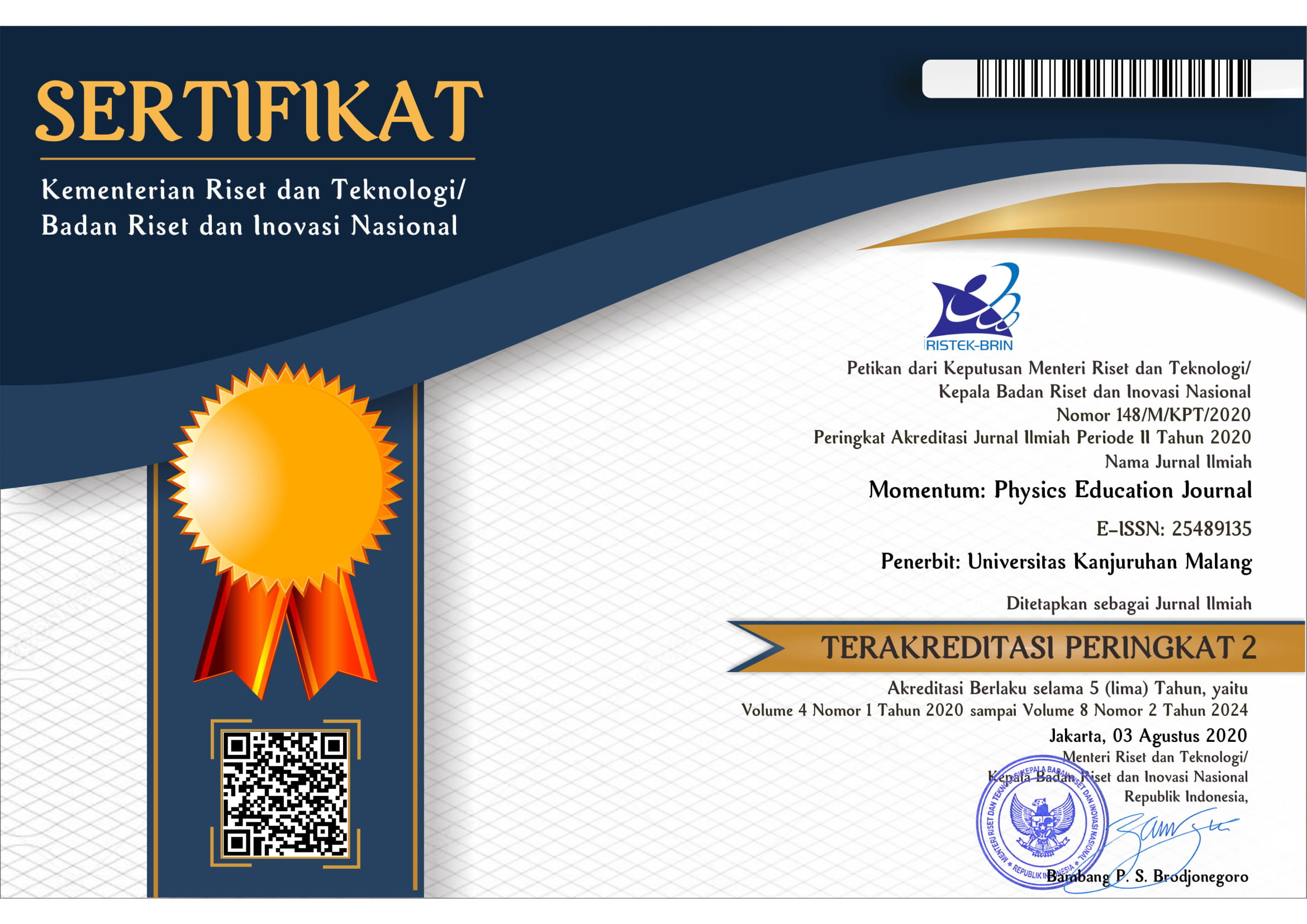Project-based inquiry-science: An innovative learning for thinking, teaching and assessing science-physics
DOI:
https://doi.org/10.21067/mpej.v6i1.6254Keywords:
Project-based Inquiry-Science, Innovative learning, meta-aggregationAbstract
Project-based Inquiry Science (PjBI-Science) is one of the embodiments of innovative learning designed for students to have abilities like scientists and to experience various investigative methodologies, which include experimentation, modelling, simulation, and data analysis in the fields of earth science, life science, and physical sciences. Not only beneficial for students, but PjBI-Science also facilitates teachers to be able to design detailed learning processes and conduct assessments according to students' thinking skills and abilities, both individually and in groups. This study aims to identify the characteristics and find the benefits of implementing PjBI-Science learning. The research method used is a systematic review with a meta-aggregation method that summarizes the results of research related to PjBI-Science qualitatively. Based on the literature review results to identify the characteristics of the implementation of PjBi-Science, conclusions were obtained regarding the benefits of implementing learning. For students, it can improve the quality of abilities in the natural science field and accommodate the learning needs to optimize thinking skills, while for teachers, it can holistically provide alternative teaching styles in an innovative way and conduct an effective assessment of the activities and cognitive abilities of students.
Downloads
References
Anazifa, R. D., & Djukri, D. (2017). Project-based learning and problem-based learning: Are they effective to improve student’s thinking skills? Jurnal Pendidikan IPA Indonesia, 6(2), 346. https://doi.org/10.15294/jpii.v6i2.11100
Chu, K. W. S. (2009). Inquiry project-based learning with a partnership of three types of teachers and the school librarian. Journal of the American Society for Information Science and Technology, 60(8), 1671–1686. https://doi.org/10.1002/ASI.21084
Fitzgerald, M., Danaia, L., & McKinnon, D. H. (2019). Barriers inhibiting inquiry-based science teaching and potential solutions: perceptions of positively inclined early adopters. Research in Science Education, 49(2), 543–566.
Gillies, R. M., & Rafter, M. (2020). Using visual, embodied, and language representations to teach the 5E instructional model of inquiry science. Teaching and Teacher Education, 87, 102951.
Guo, P., Saab, N., Post, L. S., & Admiraal, W. (2020). A review of project-based learning in higher education: Student outcomes and measures. International Journal of Educational Research, 102(April), 101586. https://doi.org/10.1016/j.ijer.2020.101586
Harrer, B. W., Flood, V. J., & Wittmann, M. C. (2013). Students talk about energy in project-based inquiry science. AIP Conference Proceedings, 1513(1), 162. https://doi.org/10.1063/1.4789677
Himes, M., Spires, H., Krupa, E., & Good, C. (n.d.). An Interdisciplinary Project-Based Inquiry Global Process.
Khalaf, B. K., Zin, M., & Bt, Z. (2018). Traditional and inquiry-based learning pedagogy: a systematic critical review. International Journal of Instruction, 11(4), 545–564.
Kolodner, J. L., Krajcik, J. S., Edelson, D. C., Reiser, B. J., & Starr, M. L. (2010). Project-based inquiry scienceTM. Project-Based Inquiry ScienceTM (PBIS).
Larroder, A. C. (2021). Addressing the challenges and scaffolding of inquiry-based teaching on secondary school students’ efficacy in conducting scientific inquiry. In Science Education Research and Practice from Japan (pp. 45–61). Springer.
Lau, W. W. F., Lui, V., & Chu, S. K. W. (2017). The use of wikis in a science inquiry-based project in a primary school. Educational Technology Research and Development, 65(3), 533–553. https://doi.org/10.1007/s11423-016-9479-9
Lockwood, C., Munn, Z., & Porritt, K. (2015). Qualitative research synthesis: methodological guidance for systematic reviewers utilizing meta-aggregation. JBI Evidence Implementation, 13(3), 179–187.
Longa, M. K. (2021). Instrumen performance assessment berbasis kerja laboratorium untuk mengukur keterampilan proses dan sikap ilmiah. Measurement in Educational Research (Meter), 1(1), 39–51. https://doi.org/10.33292/meter.v1i1.109
Miller, E. C., Severance, S., & Krajcik, J. (2021). Motivating teaching, sustaining change in practice: Design principles for teacher learning in project-based learning contexts. Journal of Science Teacher Education, 32(7), 757–779.
Ng, C. H., & Adnan, M. (2021). The effect of using project-based inquiry learning (PIL) stem module in topic space among year one students. Psychology and Education Journal, 58(1), 4718–4726. https://doi.org/10.17762/pae.v58i1.1631
Ninan, J. (2020). Online naturalistic inquiry in project management research: directions for research. Project Leadership and Society, 1, 100002.
Ong, E. T., Ayob, A., Ibrahim, M. N., Adnan, M., Shariff, J., & Ishak, N. (2016). The effectiveness of an in-service training of early childhood teachers on stem integration through project-based inquiry learning (PIL). Journal of Turkish Science Education, 13(special), 44–58. https://doi.org/10.12973/tused.10170a
Owensby, J. N. (2006). Exploring the development and transfer of case use skills in middle-school project-based inquiry classrooms [Georgia Institute of Technology]. https://smartech.gatech.edu/bitstream/handle/1853/10525/owensby_jakita_n_200605_phd.pdf
Panasan, M., & Nuangchalerm, P. (2010). Learning outcomes of project-based and inquiry-based learning activities. Online Submission, 6(2), 252–255.
Riga, F., Winterbottom, M., Harris, E., & Newby, L. (2017). Inquiry-based science education. In Science education (pp. 247–261). Brill Sense.
Tarwiyani, T., Ibrohim, I., & Mahanal, S. (2019). Penerapan pembelajaran sains berbasis inquiry based learning terintegrasi nature of science dalam meningkatkan keterampilan metakognitif siswa. Jurnal Pendidikan: Teori, Penelitian, Dan Pengembangan, 4(10), 1341. https://doi.org/10.17977/jptpp.v4i10.12841
Thi Thuy, H., Dieu Thuy -Ha, H., Hoe Ng, C., Adnan, M., Chee, K., & Pinang, P. (2018). Integrating STEM education through Project-Based Inquiry Learning (PIL) in topic space among year one pupils. IOP Conference Series: Materials Science and Engineering, 296(1), 012020. https://doi.org/10.1088/1757-899X/296/1/012020
Thys, M., Verschaffel, L., Van Dooren, W., & Laevers, F. (2016). Investigating the quality of project-based science and technology learning environments in elementary school: a critical review of instruments. Studies in Science Education, 52(1), 1–27.
Tsybulsky, D., & Muchnik-Rozanov, Y. (2019). The development of student-teachers’ professional identity while team-teaching science classes using a project-based learning approach: A multi-level analysis. Teaching and Teacher Education, 79, 48–59.
Xiao, Y., & Watson, M. (2019). Guidance on conducting a systematic literature review. Journal of Planning Education and Research, 39(1), 93–112.
Downloads
Published
How to Cite
Issue
Section
License
Copyright (c) 2022 Momentum: Physics Education Journal

This work is licensed under a Creative Commons Attribution-ShareAlike 4.0 International License.


.png)
.png)
.png)
.png)




